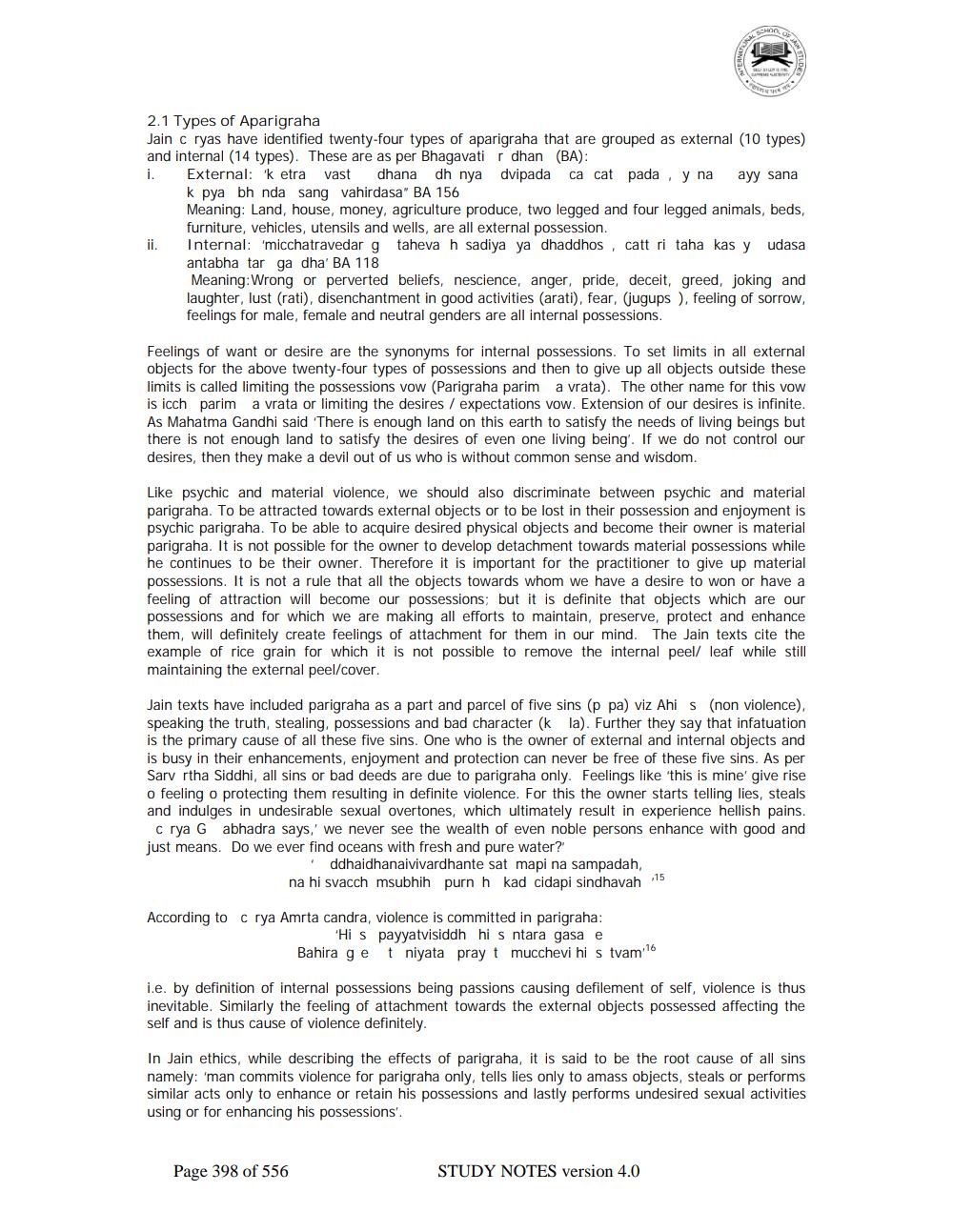________________
2.1 Types of Aparigraha
Jain c ryas have identified twenty-four types of aparigraha that are grouped as external (10 types) and internal (14 types). These are as per Bhagavati r dhan (BA):
i.
ii.
External: 'k etra vast dhana dh nya dvipada ca cat pada, y na ayy sana k pya bh nda sang vahirdasa" BA 156
Meaning: Land, house, money, agriculture produce, two legged and four legged animals, beds, furniture, vehicles, utensils and wells, are all external possession.
Internal: 'micchatravedar g taheva h sadiya ya dhaddhos, catt ri taha kas y udasa antabha tar ga dha' BA 118
Meaning: Wrong or perverted beliefs, nescience, anger, pride, deceit, greed, joking and laughter, lust (rati), disenchantment in good activities (arati), fear, (jugups ), feeling of sorrow, feelings for male, female and neutral genders are all internal possessions.
Feelings of want or desire are the synonyms for internal possessions. To set limits in all external objects for the above twenty-four types of possessions and then to give up all objects outside these limits is called limiting the possessions vow (Parigraha parim a vrata). The other name for this vow is icch parim a vrata or limiting the desires / expectations vow. Extension of our desires is infinite. As Mahatma Gandhi said 'There is enough land on this earth to satisfy the needs of living beings but there is not enough land to satisfy the desires of even one living being'. If we do not control our desires, then they make a devil out of us who is without common sense and wisdom.
Like psychic and material violence, we should also discriminate between psychic and material parigraha. To be attracted towards external objects or to be lost in their possession and enjoyment is psychic parigraha. To be able to acquire desired physical objects and become their owner is material parigraha. It is not possible for the owner to develop detachment towards material possessions while he continues to be their owner. Therefore it is important for the practitioner to give up material possessions. It is not a rule that all the objects towards whom we have a desire to won or have a feeling of attraction will become our possessions; but it is definite that objects which are our possessions and for which we are making all efforts to maintain, preserve, protect and enhance them, will definitely create feelings of attachment for them in our mind. The Jain texts cite the example of rice grain for which it is not possible to remove the internal peel/ leaf while still maintaining the external peel/cover.
Jain texts have included parigraha as a part and parcel of five sins (p pa) viz Ahi s (non violence), speaking the truth, stealing, possessions and bad character (k la). Further they say that infatuation is the primary cause of all these five sins. One who is the owner of external and internal objects and is busy in their enhancements, enjoyment and protection can never be free of these five sins. As per Sarv rtha Siddhi, all sins or bad deeds are due to parigraha only. Feelings like 'this is mine' give rise o feeling o protecting them resulting in definite violence. For this the owner starts telling lies, steals and indulges in undesirable sexual overtones, which ultimately result in experience hellish pains. crya G abhadra says,' we never see the wealth of even noble persons enhance with good and just means. Do we ever find oceans with fresh and pure water?
ddhaidhanaivivardhante sat mapi na sampadah, na hi svacch msubhih purn h kad cidapi sindhavah
According to crya Amrta candra, violence is committed in parigraha: 'His payyatvisiddh his ntara gasa e Bahira get niyata pray t mucchevi hi s tvam'16
15
i.e. by definition of internal possessions being passions causing defilement of self, violence is thus inevitable. Similarly the feeling of attachment towards the external objects possessed affecting the self and is thus cause of violence definitely.
In Jain ethics, while describing the effects of parigraha, it is said to be the root cause of all sins namely: 'man commits violence for parigraha only, tells lies only to amass objects, steals or performs similar acts only to enhance or retain his possessions and lastly performs undesired sexual activities using or for enhancing his possessions'.
Page 398 of 556
STUDY NOTES version 4.0




